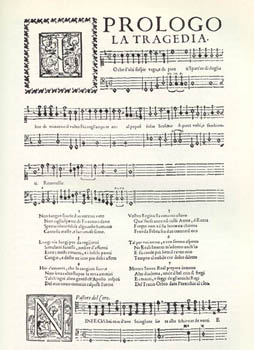On a high note that won't stop
 On this date… let me take a deep breath and really let this one go… the earliest opera we still have had its first performance. Euridice by Jacopo Peri was performed in Florence on October 6, 1600 “signifying” according to Wikipedia “the beginning of the Baroque period.”
On this date… let me take a deep breath and really let this one go… the earliest opera we still have had its first performance. Euridice by Jacopo Peri was performed in Florence on October 6, 1600 “signifying” according to Wikipedia “the beginning of the Baroque period.”
Obviously it’s an oversimplification or at least a very bold simplification to date the start or end of an artistic period to a particular day. But Oct. 6 1600 is as good a day as any because both opera and Baroque are, how shall I put this in a suitably Philistine manner, rather over the top.
I mean in one sense opera is just theatre where they dance and sing instead of walking and talking. And why not? Dancing and singing are good… unless I’m doing them, but that’s a topic for another day. Or perhaps decade. Like the 2070s. Meanwhile can I just say that the thing about opera is that it rather is to singing as Baroque is to decoration. It’s incredibly impressive. But it’s dazzling, overdone and in the end I admire the technical accomplishment more than I enjoy the thing.
At this point you’re probably raising your hand, or baton, to suggest that I don’t seem to know much about opera. And I don’t. Once I’ve told the joke about the diva who had no sideways I’m pretty much done except I know Mozart wrote some and they were probably among the best. I’m not even all that sure whether the dancing is in operas or mostly in ballet where people make impossible feats look easy but don’t sing much though I’m pretty sure there’s dancing in at least one Mozart opera because I watched Amadeus. So there. But clearly there are different kinds of opera, some of which try not to go over the top and fail and others embrace it with gusto-o-o-ooooooo (here the wine glass shatters).
Indeed, early opera was thought too frivolous and so some very straight-laced people tried to make it long and dull. Or allow “opera buffa” for rubes who actually liked to laugh during an evening out. (Or out cold if the opera was dull enough.) Then they started castrating people which is just never a good thing. Then you got “bel canto” which means beautiful singing which makes me wonder what had gone before and why. Then they decided the songs were too intricate and showy and maybe it would be better with some actual tunes, an idea associated I gather with Verdi. Already I like him. But he still wrote operas so maybe not so much. And people followed him up with melodramatic opera which strikes me as painting the lily. (Yes, that is the real expression, from Shakespeare’s King John, not “gilding the lily” which makes no sense. I assure you.)
So on it goes. And there I sit sympathizing with Captain Haddock, in Tintin, saying whenever he hears Bianca Castafiori sing it reminds him of the hurricane that struck his ship off the Azores.
By the way, there seems to be an opinion out there that the whole thing was a misunderstanding, that in trying to revive classical art in the “Renaissance” or rebirth of not being dirty poor ignorant and superstitious during the Dark and Middle Ages (another misunderstanding, incidentally) some smart-alecky Italians thought the “chorus” sang in Greek plays and maybe everyone else did. So they revived something that never existed. The first “opera” ever, Dafne by Peri, “is unfortunately lost” according to Wikipedia. I’m not sure how unfortunate it is given that first tries are not always successful and given that Euridice isn’t generally performed today because it’s not, you know, any good. But however that may be, opera caught on and there’s nothing we can do about it now.